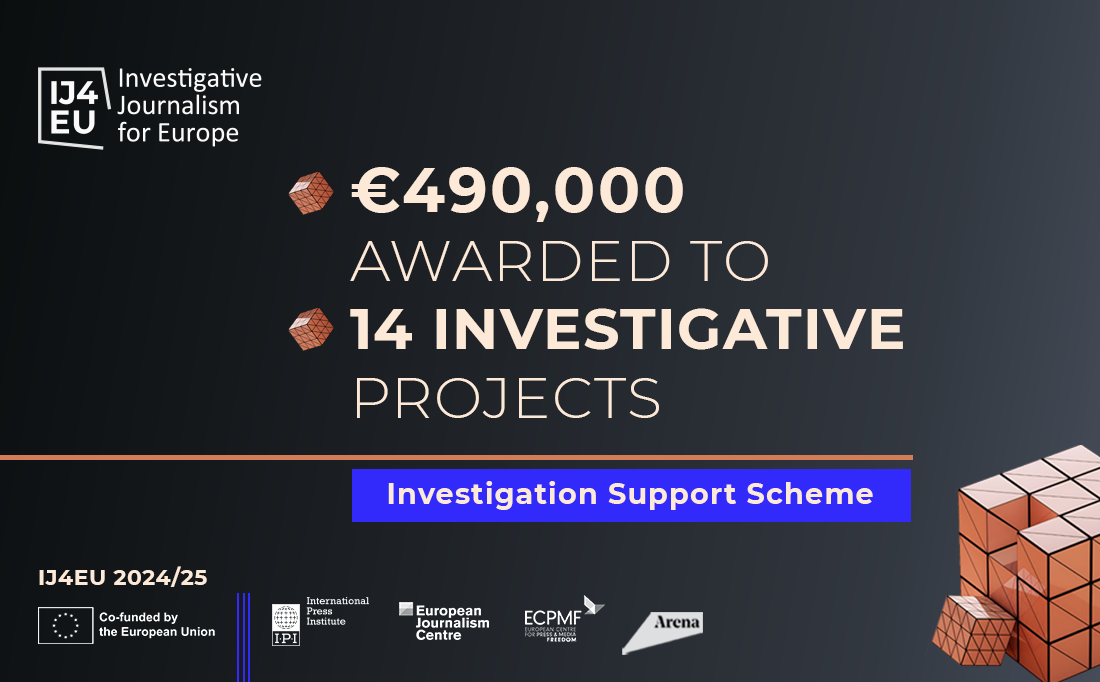Fourteen teams of journalists collaborating across borders will receive a combined €490,000 to pursue ambitious investigations with the public interest at their heart, thanks to the latest round of grants from the IJ4EU fund.
Spanning 36 countries, the teams will dig into everything from secretive surveillance and environmental crimes to animal trafficking and the weaponisation of AI to manage migration.
Each team brings together journalists from at least two European countries to collaborate on complex stories that transcend frontiers.
The funding comes from IJ4EU’s Investigation Support Scheme, which backs watchdog journalism with grants of up to €50,000, along with access to legal support, training and networking opportunities.
An independent jury chaired by award-winning Salvadoran journalist Carlos Dada selected the projects from a pool of 132 proposals submitted under the third and final funding round of the current edition of IJ4EU.
Over the course of the 2024/25 edition, the Investigation Support Scheme has allocated a combined €1.5 million to 44 cross-border journalistic teams. The Vienna-based International Press Institute (IPI) administers the scheme.
“As always, the independent jury had a heck of a time choosing which investigations to fund,” said Timothy Large, director of independent media programmes at IPI and head of the IJ4EU fund.
“The quality of applications was astonishing. It feels like we’re living in seismic times, and the stories on the table reflect that. I don’t think there’s ever been a more important moment to support watchdog journalism as a public good.”
Meet the grantees
Full details of the topics remain under wraps for now to protect the integrity of investigations, but the diversity of teams and the geographical scope of their stories underline the importance of cross-border cooperation in exposing wrongdoing and holding power to account.
In no particular order, the selected projects are:
- A cross-border, data-driven investigation by journalists in five countries, uncovering the money trails of companies, agencies and other state and non-state actors cashing in on the EU’s multi-billion-euro AI tech push to manage migration – grant awarded: €42,190
- A cross-border investigation into agricultural practices that endanger the health of workers in the tropical fruit industry, grown for export to Europe – €32,090
- Phase two of a cross-border investigation into environmental and human rights abuses in the steel industry – €9,950
- A cross-border investigation into human rights issues in a South African prison led by Investigative Reporting Denmark – €14,760
- A cross-border investigation into the race to extract lithium from two of Europe’s biggest reserves: the Cínovec site on the Czech-German border and the Jadar project in western Serbia – €11,550
- A cross-border investigation into animal trafficking centred on the Balkan region – €50,000
- A cross-border investigation into how extremist actors and disinformation networks undermine democratic institutions across Central and Eastern Europe – €48,000
- A cross-border, data-driven investigation into an international surveillance company – €48,600
- A cross-border investigation into lobbying activities at the crossroads of security, international law, migration and free speech- €49,500
- An investigation led by the Investigative Center of Jan Kuciak into hostile narratives targeting human rights defenders in Central Europe – €34,600
- An investigation into how plastic recycling is actually carried out in practice – €41,000
- Exporting censorship: how states deliver technology to other countries to control speech and suppress public access to information – €49,046.32
- A large cross-border investigation into nature loss across Europe – €22,500
- A deep dive into the European players driving controversial practices in the hunt for critical minerals – €34,600
The total amount allocated under this round of the Investigation Support Scheme was €488,386.32.
Sparking debate
The five-person jury met for more than five hours on April 2, weighing criteria including news value, feasibility, cross-border relevance, risk planning and potential for public impact. The identities of jury members will be made public shortly.
The chosen teams include journalists based in 19 EU states, four EU candidate countries and 13 nations further afield: Argentina, Brazil, Canada, India, Indonesia, Israel, Ivory Coast, Mexico, Norway, South Africa, Switzerland, United Kingdom and the United States.
While this announcement focuses on the Investigation Support Scheme, IJ4EU runs a parallel funding track designed primarily for freelancers. The next round of grants under the Freelancer Support Scheme, managed by the European Journalism Centre (EJC), will be announced soon.
Both schemes operate under a strict commitment to editorial independence. Neither donors nor IJ4EU’s implementing partners have any say in which projects are selected. That task falls solely to the independent juries.
IPI leads the IJ4EU consortium in partnership with the EJC, the European Centre for Press and Media Freedom and Arena for Journalism in Europe. Each partner contributes to different parts of the programme, from managing grants to running conferences and awards, legal support and mentoring.
The latest call for proposals under both the Investigation Support Scheme and Freelancer Support Scheme broke a geographical record, drawing applications from cross-border teams with members based in 74 countries. They sought a combined €5.97 million in funding.
Since its inception in 2018, IJ4EU has awarded almost €6 million to hundreds of transnational investigations that have broken major stories and sparked debate across Europe and beyond.
To learn more about past grantees and funded projects, visit the IJ4EU projects page.
